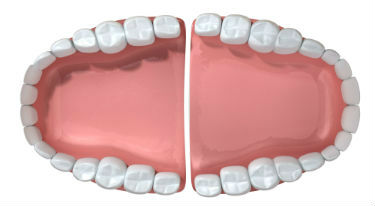Call: (203) 758-2116
Custom Dentures
Many people assume that they will need dentures as they age, but losing teeth is not a normal part of the aging process. If you care for your teeth well and guard against gum disease you should be able to keep your teeth for a lifetime.
Saving even a few natural teeth is often better than losing them all. Natural teeth or even parts of natural teeth can help you retain bone in your jaw and can act as stable supports for bridges, overdentures or removable partial dentures. Dr. Smith and Dr. Manda will try to save as many of your natural teeth as possible.
Full dentures are made for people who have lost all of their teeth. They are called complete dentures. Complete dentures can be given additional support by placement of implants in the bone under the denture.
With state-of-the-art materials and modern technology, Dr. Smith and Dr. Mandava can fashion dentures that fit comfortably, appear natural and help you stay healthier. Denture problems, such as clicking, slipping, frequent gum irritation and odor, are signs your dentures may not be fitting properly and may need to be adjusted, relined or remade.
Although dentures may look like your natural teeth, they cannot work like them. Simple actions like speaking and eating may feel different. You will have to learn how to use and adjust to your dentures, which for some patients can take several months.
Removable Partial Dentures
Removable partial dentures are composed of a metal framework with plastic teeth and gum areas. The framework includes metal clasps or other attachments, which hold the denture in place. However, partial dentures are removed easily for cleaning.
Two types of attachments are used in partial dentures — metal clasps and precision attachments. Metal clasps are C-shaped, I-shaped and Y-shaped parts of the denture framework that fit around neighboring natural teeth. These teeth may require shaping to help hold the clasps and keep the denture securely in place. A precision attachment is like a key fitting into a keyhole. A crown that is placed over your tooth contains the “keyhole.” The denture contains the “key.” When you put in your denture, the “key” fits into the “keyhole” in the crown. This type of denture looks better because no clasps are visible and it also fits tighter.
We may suggest a flipper denture which is made of acrylic and replaces one or more teeth temporarily until another form of treatment (bridge, implants) can be made or decided upon. Such a denture can be placed immediately or soon after a tooth is extracted, but it is not meant to be a permanent solution.

Complete Dentures
Complete dentures cover your entire jaw, either upper or lower. Some people call them “plates.” Complete dentures rest directly on the gum that covers the bone. On occasion, one or more natural teeth are kept when a denture is made. These teeth usually have root canal treatment and are shortened to fit under the denture. This type of denture is known as an overdenture.
Maintaining a few natural teeth and replacing the missing teeth with an overdenture has several advantages:
- Your natural teeth help preserve bone which allows for future treatment options if you choose.
- Your remaining natural teeth bear some of the chewing pressure, which reduces pressure on other areas of the jaw.
- Your remaining teeth improve the stability of the denture and make it less likely to shift in your mouth.
- Your sense of where your jaw is in space and the pressure you are placing on the denture is better than the sense you have after losing all of your teeth.
- Keeping some teeth can help you psychologically accept your denture.
Lower dentures tend to be more difficult to keep in your mouth than upper dentures. Therefore, an overdenture can be particularly helpful for the lower jaw, but it is an option for almost anyone who has a few teeth remaining. However, the teeth that will be preserved must meet certain standards of health. Canines and premolars are the most common teeth selected because of their root length and position in the jaw.
The teeth will have to be shaped to fit the denture. Since the shaping may expose the tooth’s living pulp, the teeth usually need root canal treatment, which removes the pulp and replaces it with filling material. This will keep your teeth pain free.
The teeth are covered with thin metal castings called copings, which fit into openings in the denture. Attachments also can be put on the copings so the denture is better retained in the mouth. On occasion, a natural tooth can be kept in the mouth without a metal coping. If this is done, it is important that the dentist prescribes fluoride drops that can be placed in the overdenture to prevent decay of the underlying tooth structure.
Overdentures also can fit over implants instead of natural teeth. In fact, implants originally were developed to give people “artificial roots” on which to place bridges or dentures in the lower jaw. The denture can fit directly onto the implants, or a metal bar can link implants together, providing support for the denture.
Conventional Dentures
Conventional dentures are made and inserted after your teeth have been taken out and the gums have healed.
A conventional denture can be made and is fitted typically within four or more appointments over one to two months. The process starts with an appointment with Dr. Smith or Dr. Mandava for an exam and a discussion of what will work best for you. In later visits, we will take impressions of your mouth and establish the bite (the way your teeth come together). You and your doctor will then select the color of your teeth for your denture. The size, shape and color of the teeth will depend on many factors, including reference points in your mouth, your skin tone and the shape of your skull, photographs, etc.
At your trial fitting, your teeth will be set up and tried in your mouth. You can see how the denture looks and feels in your mouth, and Dr. Smith and Dr. Mandava can make sure it fits and functions correctly and harmonizes with the rest of your face. This is your denture preview, or “try-in.” If this goes well, you will receive the completed denture at the next visit, along with instructions from Dr. Smith and Dr. Mandava on eating, speaking, denture care and oral hygiene. Finally, you will need to see us for a series of follow-up visits during the next few weeks and months to check the fit and comfort of your denture.
Immediate Dentures
Dr. Smith and Dr. Mandava may suggest an immediate denture for you if you are having teeth extracted and / or implants placed and a healing period of several weeks or months is required prior to having your permanent complete denture made. The immediate denture would be delivered at the time of the extractions. This will allow you to eat and speak without problems while the complete denture is made. The immediate denture also instills confidence that you can interact with your family, friends and co-workers without them knowing that you have had surgery. As your mouth heals, the gums and bones will shrink and the immediate denture will be relined. This process adjusts the fit of the denture and makes you comfortable wearing it.
